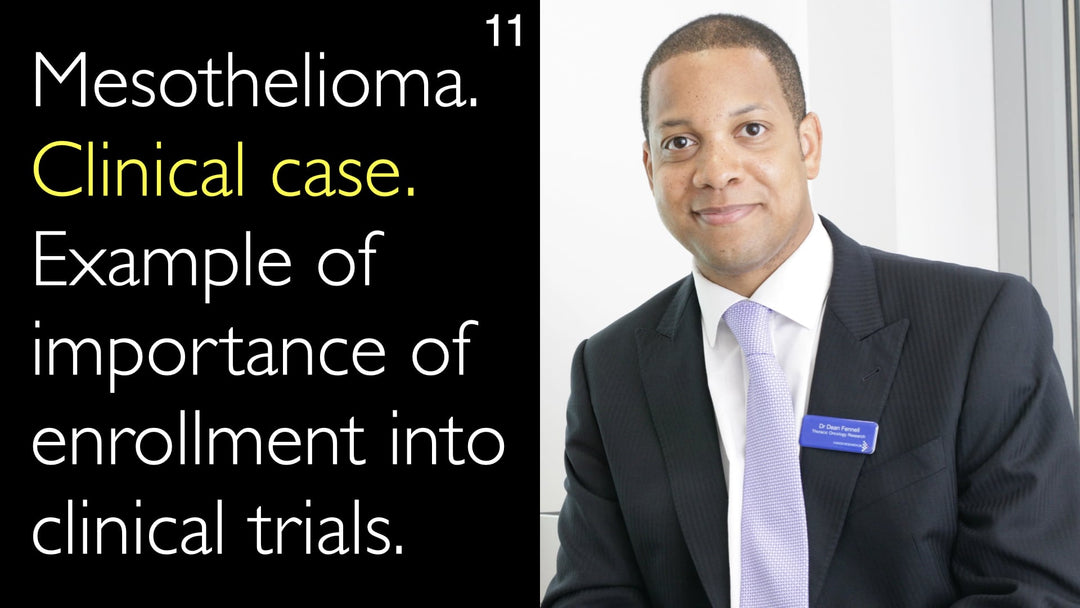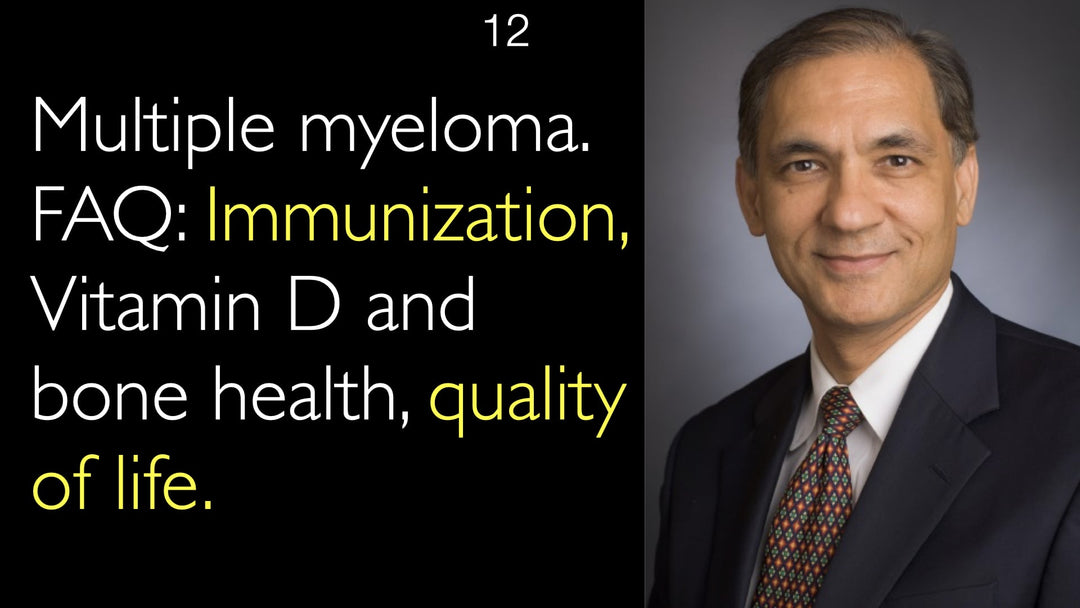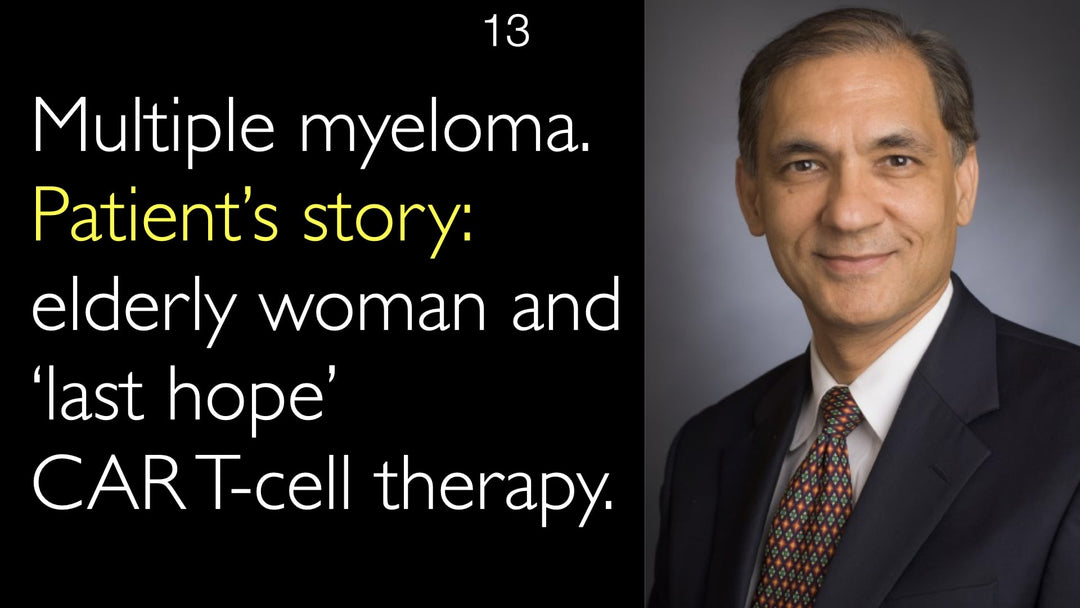Leading expert in mesothelioma, Dr. Dean Fennell, MD, explains the critical importance of clinical trials for advanced treatment. He shares a compelling clinical case where a novel PARP inhibitor provided significant tumor shrinkage and extended patient survival for over a year. Dr. Dean Fennell, MD, emphasizes that access to clinical trials can dramatically improve quality of life and outcomes, even for patients who may otherwise be deemed unfit for systemic therapy. His ongoing research focuses on identifying genetic alterations that predict treatment response, advancing the field of stratified medicine for mesothelioma.
Advancing Mesothelioma Treatment Through Clinical Trials and Precision Medicine
Jump To Section
- The Critical Role of Clinical Trials in Mesothelioma
- PARP Inhibitor Success in Mesothelioma Treatment
- Identifying Genetic Biomarkers for Treatment Response
- Improving Quality of Life and Survival Extension
- The Future of Stratified Medicine in Oncology
- Full Transcript
The Critical Role of Clinical Trials in Mesothelioma
Dr. Dean Fennell, MD, emphasizes that clinical trials represent a vital pathway for mesothelioma treatment advancement. He observes that patients enrolled in clinical trials consistently demonstrate better outcomes compared to those receiving standard care. This pattern holds true even for patients who present with significant symptoms or disease progression at enrollment.
Dr. Dean Fennell, MD, notes that many trial participants would typically be considered unfit for conventional systemic therapies. Clinical trials provide these patients access to novel treatments that can potentially arrest tumor growth. The opportunity to participate in commercial studies and investigator-designed trials has proven transformative for numerous mesothelioma patients under Dr. Fennell's care.
PARP Inhibitor Success in Mesothelioma Treatment
Dr. Dean Fennell, MD, shares a remarkable case study involving a PARP inhibitor introduced approximately two years ago. A subset of mesothelioma patients experienced significant tumor shrinkage while receiving this novel targeted therapy. The treatment demonstrated extended efficacy, maintaining positive results for over one year in responsive patients.
Dr. Dean Fennell, MD, emphasizes the authenticity of these results, noting that such prolonged benefits cannot be fabricated with placebo effects. Several patients who responded to the PARP inhibitor remain alive and continue to receive treatment in various clinical settings. This case exemplifies how investigational therapies can provide substantial clinical benefit even before randomized trial data becomes available.
Identifying Genetic Biomarkers for Treatment Response
Dr. Dean Fennell, MD, explains that the PARP inhibitor was administered to an enriched patient population based on specific genetic characteristics. His team conducted extensive exome sequencing of responsive patients to identify the molecular drivers of treatment efficacy. The unpublished data reveals a consensus group of cancer genetic alterations that appear to predispose patients to positive outcomes.
Dr. Fennell's research has identified certain mesothelioma-associated genes that responsive patients consistently carried. These findings will be published later this year, contributing valuable knowledge to the field of precision oncology. The identification of predictive biomarkers represents a significant advancement in personalized mesothelioma treatment strategies.
Improving Quality of Life and Survival Extension
Dr. Dean Fennell, MD, highlights the dual benefits of clinical trial participation—both quality of life improvement and survival extension. Patients who might otherwise face limited treatment options and poor prognosis can experience dramatic improvements through innovative therapies. The introduction of novel treatments during disease progression can effectively manage symptoms and enhance daily functioning.
Dr. Fennell references patients who have survived seven years beyond initial progression points through sequential clinical trial participation. This extended survival timeframe demonstrates the cumulative benefit of accessing multiple investigational therapies. The ability to introduce effective treatments at various disease stages fundamentally changes the mesothelioma treatment landscape.
The Future of Stratified Medicine in Oncology
Dr. Dean Fennell, MD, discusses the broader implications of his work for stratified medicine approaches across oncology. The conversation with Dr. Anton Titov, MD, explores how molecular profiling and biomarker identification are transforming cancer treatment paradigms. This precision medicine approach aligns with advancements discussed by other leading researchers, including Professor Paul Matthews' work in brain imaging and multiple sclerosis.
Dr. Fennell's mesothelioma research contributes to the growing evidence that targeted therapies based on genetic profiling yield superior outcomes. The systematic identification of patient subgroups most likely to respond to specific treatments represents the future of oncology care. This approach maximizes treatment efficacy while minimizing unnecessary exposure to ineffective therapies and their associated side effects.
Full Transcript
Dr. Anton Titov, MD: Professor Fennell, is there a clinical story or vignette that you could perhaps discuss that illustrates some of the topics on mesothelioma diagnosis, treatment, and research that we discussed today?
Dr. Dean Fennell, MD: Yes, I think the main thing for me is this role of clinical trials. We await the results of randomized studies to see whether they're positive or not. But the clear evidence to me is that patients who have access to clinical trials seem to do better.
We have had this opportunity to arrest the growing tumor of particular patients—I can think of one or two—and we've done this many, many times. There are many trials that we have designed and opened, and we have had access to commercial studies. There are a number of patients I can think of who have been in these studies.
Now, bearing in mind that some of these patients, a number of years ago, may have been symptomatic at the point at which they were progressing, it tells me that these patients would almost certainly—had they not gone to clinical trials—have been deemed unfit for any form of systemic therapy. Maybe a few weeks or months down the line.
And so when seven years later we see that, yes, we had recurrent progression, we had metastasis occurring within the settings of progression, but we are able to introduce treatments that improve the quality of life. Also, I think we undoubtedly can extend life in these patients.
So it's kind of given me confidence in knowing that even these small studies, where we're testing quite novel proof of concepts in the clinic, can have dramatic effects.
One particular case I can think of, just to finish: we took our PARP inhibitor into the clinic about 18 months to two years ago. And we have a subset of patients who gained tumor shrinkage on this novel drug and extended efficacy for over a year. It's hard to fake that with a drug that's active.
These patients with mesothelioma are still alive; they're still receiving treatment in other settings. But it's very gratifying that we can offer these mesothelioma treatments to patients and, in some instances, actually see a real benefit even before the randomized trial has been published.
Dr. Anton Titov, MD: Thank you. Did that particular patient have a known mutation that could be more susceptible to the PARP inhibitor, or was the PARP inhibitor applied randomly?
Dr. Dean Fennell, MD: We apply the PARP inhibitor in what we believe to be an enriched patient population. That one patient—but we've subsequently done some exome sequencing of these patients. We're looking quite deeply at what seems to be driving tumor response.
The data is unpublished, but we are actually seeing that there are a consensus group of alterations within cancer, genetic alterations that may predispose to efficacy. Some are looking at the cohort of patients who respond. We look beyond this and can say with relative confidence that there are certain genes in mesothelioma that these patients will have had.
But yeah, that publication is coming out, hopefully soon this year.
Dr. Anton Titov, MD: Is there anything in your interest or experience, or is there any question that I should have asked but didn't ask? Is there anything you'd like to share?
Dr. Dean Fennell, MD: No, I think that's really comprehensive, actually. You covered perhaps a broader scope of topics than I might have even thought of myself if I was just talking about stratified medicine. But I hope I've given you a good bit of insight into my thoughts around broader areas of treatment of mesothelioma.
Well, the concept of stratified medicine is obviously very, very important. It's something that I've discussed with Professor Paul Matthews, an expert in brain imaging and multiple sclerosis from London, from UCL. So I think that's a very important concept going forward, for sure.
Thank you very much indeed, Anton. It's been an absolute pleasure and an honor actually to be invited for this interview. I hope that was useful for you. If there's anything else you want me to do in the future—if the video wasn't right or the light or something—let me know, and I'll try to help you.
Dr. Anton Titov, MD: That's all, Professor Fennell. Thank you very much for this conversation. It's most informative for our viewers around the world, and we hope to get back to you in the future to learn more about the progress in mesothelioma treatment. Thank you very much!
Dr. Dean Fennell, MD: Pleasure. Have a good day. You take care. Bye-bye. Thanks again.







